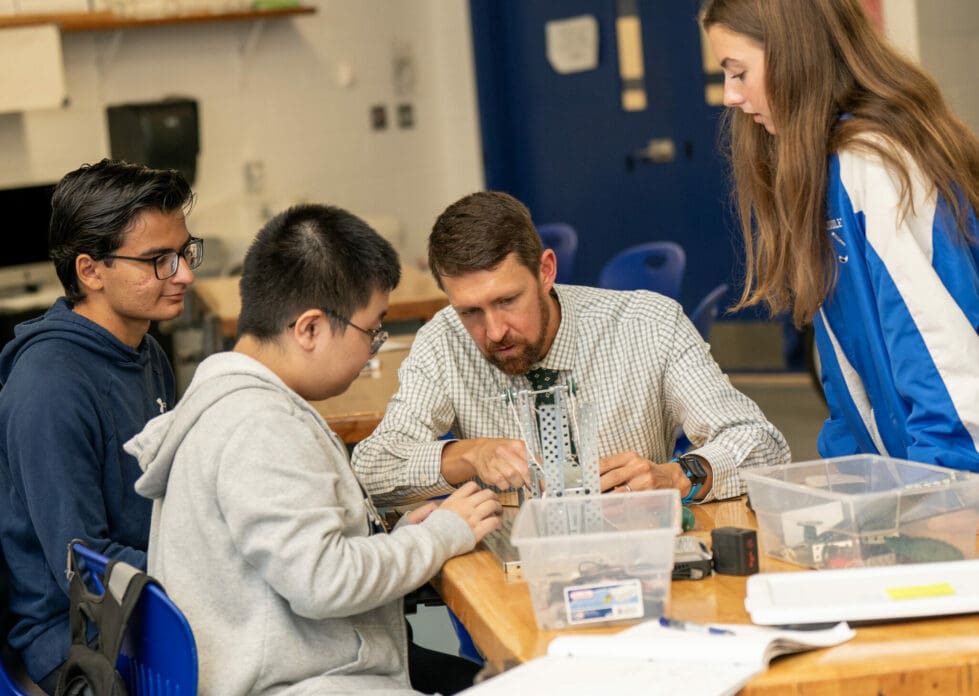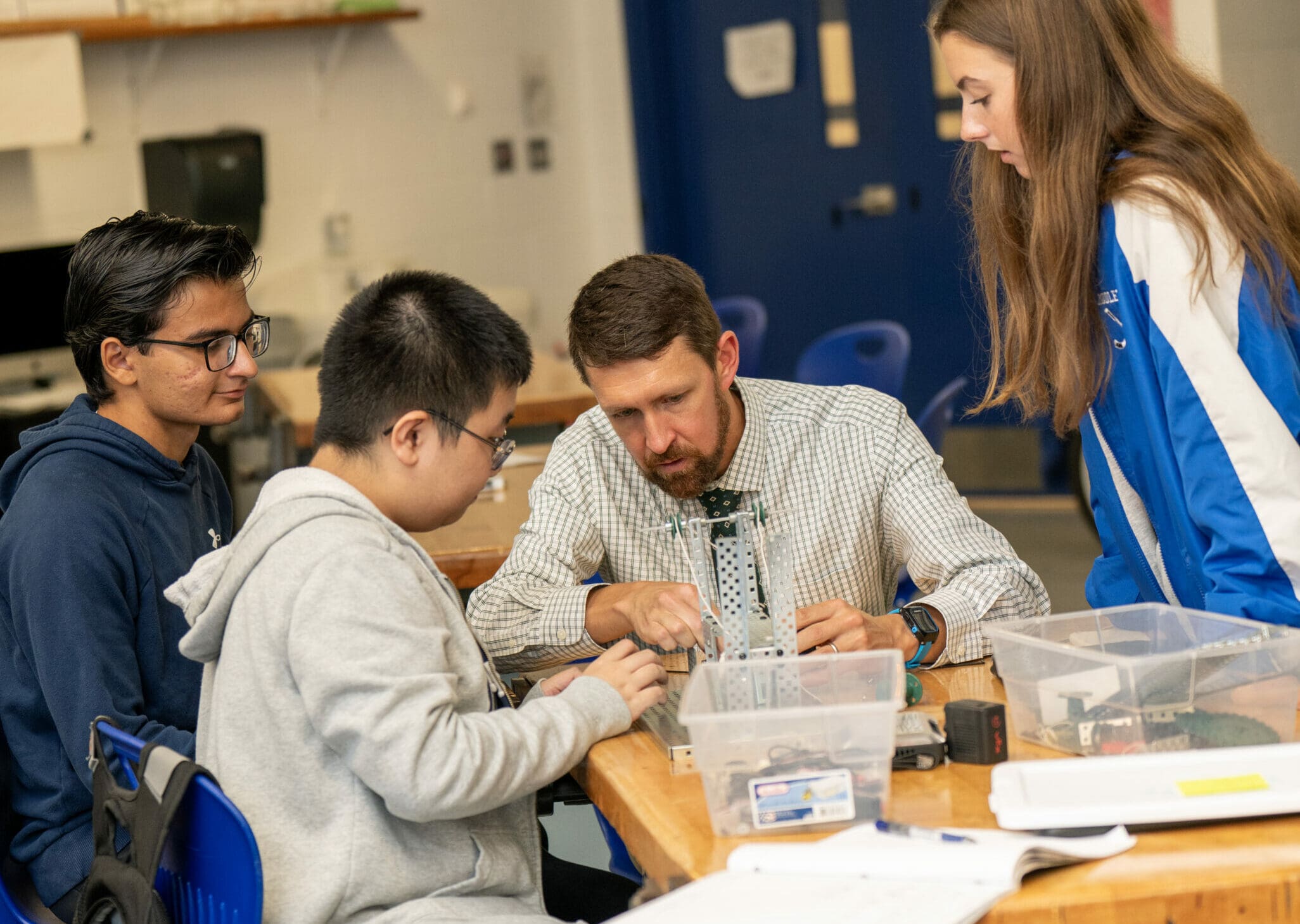Newark’s Cory Hafer entered the University of Michigan in 2005 planning on becoming a marine biologist or doctor.
Nearly two decades later, he’s making an impact in a different way: educating the youth in such an excellent manner that he was named the Delaware 2024 Teacher of the Year.
RELATED: Middletown’s Cory Hafer named 2024 Teacher of the Year
“Mr. Hafer is very open to new ideas and making things better for the environment so that way, it’s better for you as a student and also him as the teacher,” said Erin Hendricks, a sophomore at Appoquinimink School District’s Middletown High School, where Hafer has taught engineering and science since 2019.
Hendricks said his class is a lot about compromise, and rather than arguing about grades or wasting time being confused on certain assignments, production and growth is the focus.
“He’s really open to what everybody thinks is going to move the class forward, and I think that’s the main thing that really allows him to be voted for teacher of the year,” she said, “because he gets students involved and it’s more exciting when everybody has something to say instead of just directly following rules after rules and there’s no real open space where you can feel like you can connect with a teacher.”
Hafer said he draws motivations from his student’s curiosities, and those connections have helped drive his work.
But that doesn’t mean there aren’t challenges.
“It was shocking to win, and I felt so much like an impostor,” he said. “I feel like an impostor up here because I really do, and every day I get up and I’m still struggling to find ways to connect with every student and manage the workload.”
Hafer really humanized what goes into moments of success in any job.
“It’s ups and downs,” he said. “Some days, you’re just like, ‘I can do this, and I’m really inspired’ and other days, it’s exhausting, and hard to keep that perspective.”
He’s getting this remarkable achievement, but doesn’t feel good all the time, he said.
“But I’m realizing now it’s not really about me, it’s about being able to represent what our field is and represent what the students are capable of and trying to show the community in the world that teaching is really important,” he said, “and if we put a lot of energy and an invest in it, we’re going to get a huge reward.”
And Amanda Conley, principal of Middletown High School, says Hafer’s energy has certainly yielded a reward for his students.
“Cory is an amazing example of the culture we’ve created at our building,” she said. “Cory creates a classroom culture where students are able to learn in new ways and solve real-life problems. We’re beyond proud of Cory.”
She said Hafer’s selection as Delaware Teacher of the Year means everything to Middletown High School and the district.
“We have amazing staff members who are innovative, creative and work so hard in service of our students,” she said.
Career journey
“My senior year at the University of Michigan, for some reason, I don’t know why, I took this education class and it was about the history of public education in America,” Hafer said. “I did some projects in that class that kind of got me inspired to look into schools a little bit more and maybe think about teaching.”
After graduation, he worked in a research lab, which he enjoyed, but that’s where he started to realize he actually loved teaching skills in the lab and helping summer interns and new hires adjust to the lab setting.
“I also realized, as I was learning all this stuff in college about cellular molecular biology, I loved it,” he said, “But I didn’t really grasp it until I started doing it in the lab, and then all of a sudden I was like, ‘Wow, I have a really deep understanding of this stuff.’”
That’s when he really started considering teaching.
In 2010, he pursued a master’s in education from the Teachers College, Columbia University, where he graduated in 2012.
“I could see how I was going to use this content in the classroom and it was very inspiring,” he said. “I would take teaching methods classes, and I learned so much about meiosis and mitosis by having to develop lessons for students, and it was really just super fun.”
Hafer started working in New York City public schools, teaching for a year in Brooklyn before he and his family moved to Massachusetts.
There, he taught high school science for four years in Southwick, before moving again to Michigan, where he taught for two years in Ann Arbor.
Finally, he and his family ended up in Delaware in 2019, where he’s been an engineering and science teacher at Middletown High ever since.
“It’s been a journey all over, and it’s been really fun to experience different districts and just sort of see how different states think about education.”
Change in education
When he first started teaching, Hafer said the National Next Generation Science Standards had just come out and states were wrapping their heads around them.
“When I first started, there was a big push forward to get students to pass state tests, so my very first experience was like, my job is to get kids to pass a test,” he said. “And then I pretty quickly realized that’s not actually a good goal, and we’re not going to inspire students, so I think personally, I’ve shifted a lot over the years.”
He also said his first few years he didn’t have one-to-one technology with students, and transitioning to a point where every student has a computer or device allows him to ask them more complex questions.
“It’s less about me providing material and more teaching them how to find and access resources that exist,” he said. “Before it was much more focused on content, now I’m focused more on how do we use the content as a vehicle to teach skills and allow them to develop really robust skills that can be transferred into practical applications in the future?”
He said there’s definitely a reason everyone should learn chemistry and biology, but pure memorization and factual recall is becoming less important.
Teaching style
Hafer said he tries to be supportive while also giving students a lot of autonomy.
“If you come into my classroom, you’re not going to see me teaching the whole class very often,” he said. “You’re going to see me with particular students or small groups, targeting potential skills that they might need to work on or getting feedback.
He said he’s shifted away from judging performance through the standard grading assignments and focuses rather on engaging students with solving problems and learning specific skills.
“I’ll go around and when I see you struggling, or when I see something that we can celebrate, I point that out,” he said. “In the class, it feels exhausting, and it sometimes feels like I don’t even know what my role is because I’m just kind of popping around and I might teach like 20 different lessons in one class because I might have 20 kids that have slightly different needs, or be at different places.”
Hafer said his student’s self-doubts are another motivator for him.
“The other day, I had a student who hasn’t developed super strong CAD skills, and he didn’t have anything going on in his capstone projects, so I asked him ‘Why don’t you try modeling your whole prototype in CAD?,” he said.
The student told him he can’t and it’s way too complicated, to which Hafer told him there’s no harm in trying.
“And now he has a 3D model of it,” Hafer said. “We are always going to be our toughest critics, and that inspires me to support the students and let them know they can do it.”
One of Hafer’s favorite teachers growing up was David Foster, a math teacher at his high school in Michigan.
“There was something about the way that he was just passionate about math, but he was also passionate about us becoming good human beings,” Hafer said. “He would give us quotes that were handwritten on the front of these math pockets that were always super inspiring.”
State investment in education
About a third of the state’s multi-billion dollar budget annually is devoted to education.
On top of that, there’s been a plethora of legislation in the past two years focused on education and supporting teachers and students.
This includes providing mental health services and professionals, implementing school-based wellness centers, creating teacher pathway programs, giving raises and updating the salary scale of educators and more.
There’s also a 200-page report hovering over the state that was released this month that calls for $590 million to $1 billion more to be put towards public education in Delaware.
RELATED: Adding $500M+ more into education likely matter for legislature
“I think it’s awesome, and it’s really one of the most important things we can invest in when we look at society,” Hafer said. “I know that teaching as a profession doesn’t always feel the most supported, and obviously salaries are something that we’ve been working towards improving for a long time, but, you know, I do feel supported in this state.”
Personal life
Hafer and his wife have been married for 13 years and have two cats.
“And then my mom has been posting this award anywhere she could possibly find to tell people about it,” he said. “She’s told all my teachers and my mom and dad have just been incredibly excited as well, so it’s been fun to share that with them.”
He said he always tells his students that having hobbies is important to their success and development.
“I really like hiking and camping and being really active,” he said. “We go running most mornings together and do long runs on the weekend.”
Hafer and his wife also like rock climbing, cooking and photography.
“It’s fun to have a lot of hobbies like that,” he said. “It’s hard to turn off the teacher brain, I think I’m always lesson planning and thinking about stuff, but being active helps me kind of stay mentally sane.”
RELATED STORIES:


Raised in Doylestown, Pennsylvania, Jarek earned a B.A. in journalism and a B.A. in political science from Temple University in 2021. After running CNN’s Michael Smerconish’s YouTube channel, Jarek became a reporter for the Bucks County Herald before joining Delaware LIVE News.
Share this Post





